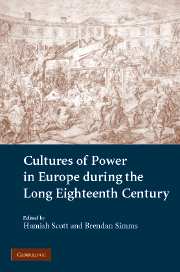Book contents
- Frontmatter
- Contents
- Preface
- List of contributors
- 1 Introduction: culture and power during the long eighteenth century
- 2 When culture meets power: the Prussian coronation of 1701
- 3 Military culture in the Reich, c. 1680–1806
- 4 Diplomatic culture in old regime Europe
- 5 Early eighteenth-century Britain as a confessional state
- 6 ‘Ministers of Europe’: British strategic culture, 1714–1760
- 7 Confessional power and the power of confession: concealing and revealing the faith in Alpine Salzburg, 1730–1734
- 8 The transformation of the Aufklärung: from the idea of power to the power of ideas
- 9 Culture and Bürgerlichkeit in eighteenth-century Germany
- 10 The politics of language and the languages of politics: Latin and the vernaculars in eighteenth-century Hungary
- 11 ‘Silence, respect obedience’: political culture in Louis XV's France
- 12 Joseph II, petitions and the public sphere
- 13 The court nobility and the origins of the French Revolution
- 14 The French Revolution and the abolition of nobility
- 15 Foreign policy and political culture in later eighteenth-century France
- 16 Power and patronage in Mozart's La clemenza di Tito and Die Zauberflöte
- 17 Between Louis and Ludwig: from the culture of French power to the power of German culture, c. 1789–1848
- Index
9 - Culture and Bürgerlichkeit in eighteenth-century Germany
Published online by Cambridge University Press: 17 July 2009
- Frontmatter
- Contents
- Preface
- List of contributors
- 1 Introduction: culture and power during the long eighteenth century
- 2 When culture meets power: the Prussian coronation of 1701
- 3 Military culture in the Reich, c. 1680–1806
- 4 Diplomatic culture in old regime Europe
- 5 Early eighteenth-century Britain as a confessional state
- 6 ‘Ministers of Europe’: British strategic culture, 1714–1760
- 7 Confessional power and the power of confession: concealing and revealing the faith in Alpine Salzburg, 1730–1734
- 8 The transformation of the Aufklärung: from the idea of power to the power of ideas
- 9 Culture and Bürgerlichkeit in eighteenth-century Germany
- 10 The politics of language and the languages of politics: Latin and the vernaculars in eighteenth-century Hungary
- 11 ‘Silence, respect obedience’: political culture in Louis XV's France
- 12 Joseph II, petitions and the public sphere
- 13 The court nobility and the origins of the French Revolution
- 14 The French Revolution and the abolition of nobility
- 15 Foreign policy and political culture in later eighteenth-century France
- 16 Power and patronage in Mozart's La clemenza di Tito and Die Zauberflöte
- 17 Between Louis and Ludwig: from the culture of French power to the power of German culture, c. 1789–1848
- Index
Summary
Gone are the days when it was fashionable to view culture as a product of longue durée sociological processes far removed from the action-packed world of high politics. Tim Blanning's work leaves us in little doubt about the importance of the state in shaping culture. This raises interesting questions about causality. In the Marxist tradition, the story was clear: each cultural superstructure was the logical and inevitable product of an equivalent economic substructure, in other words: the outflow of class consciousness. The introduction of Gramsci's ‘cultural hegemony’ slightly complicated matters, but still, from Marx to Adorno, culture was accorded no real agency. Under different auspices, one can imagine a history of culture where the ‘primacy of the state’ replaces the primacy of the socio-economic realm. In such a history, the quest for political legitimacy would engender cultural production: from blatant propaganda to subtler forms of political affirmation. By the same token, in the hands of the oppressed and disenfranchised, we can imagine culture as a means of political resistance or subversion. Such a view of ‘cultures of power’ has become well established in recent decades. But what of the power of culture? The second half of Blanning's emblematic title suggests that politics have not simply taken the place of the socio-economic substructure; causation here is an altogether more complex affair. Culture, it seems, is a power in its own right.
Of course, the claim that culture and power are mutually constitutive is not entirely new.
- Type
- Chapter
- Information
- Cultures of Power in Europe during the Long Eighteenth Century , pp. 180 - 199Publisher: Cambridge University PressPrint publication year: 2007
- 1
- Cited by



